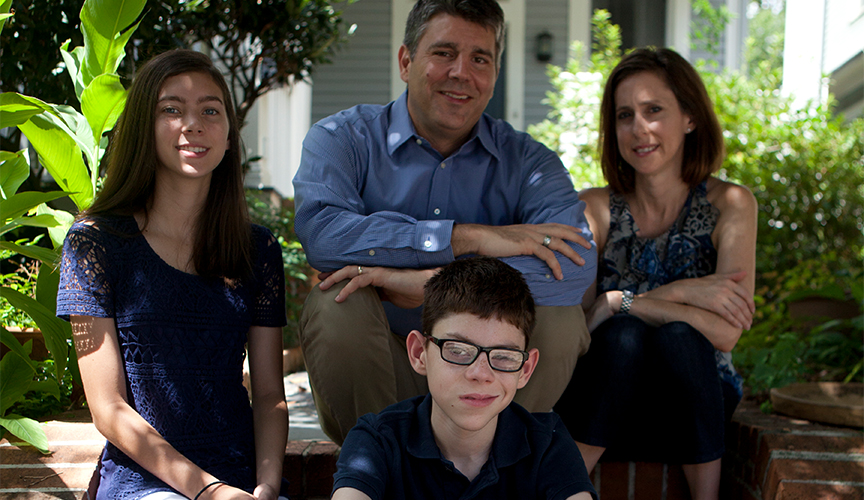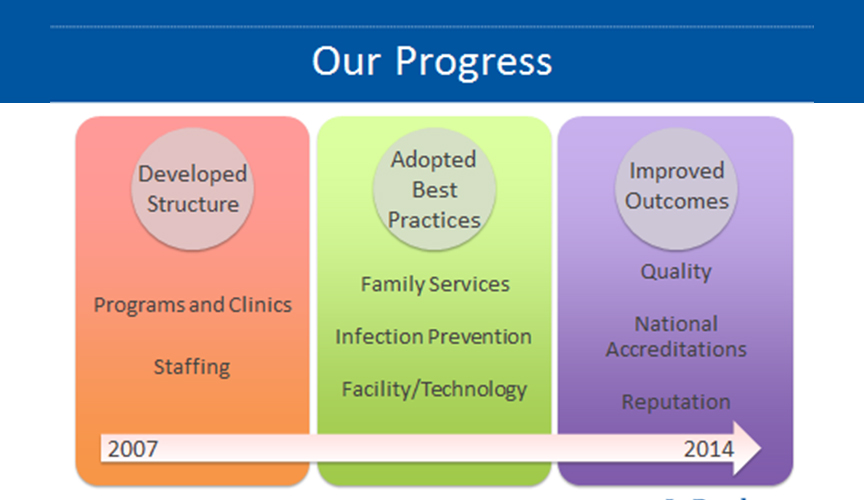Stamp of Approval
Le Bonheur uses U.S. News’ Best Children’s Hospital survey to improve care
When Pediatric Neurologist James Wheless, MD, told the Drash family of Atlanta he thought he could help their son, Billy, they didn’t hesitate to travel nearly 400 miles to Memphis, Tenn.
The Drashes, who had met with numerous neurologists throughout the country for Billy’s seizures, jumped at the chance to consult with Wheless, one of the country’s leading experts on pediatric epilepsy.
Since their initial visit years ago, the Drashes have continued to make that drive for Billy’s care at Le Bonheur Children’s Hospital, where Wheless has built a world-class epilepsy program focused on outcomes and research.

They know they are with one of the best, thanks in large part to the U.S. News & World Report “stamp of approval” that has recognized Le Bonheur’s Neuroscience Institute as one of the top pediatric neurology and neurosurgery programs in the country for six straight years.
The work that Wheless, and the rest of Le Bonheur, puts in to make that list is a concerted effort to implement best practices and improve outcomes for patients like Billy. U.S. News recognized Le Bonheur in 2016 specifically for its comprehensive multidisciplinary programs, clinical best practices and patient outcomes
Journey to recognition
Since it first applied in 2007, Le Bonheur has used U.S. News’ Best Children’s Hospital survey as a standard bearer for best practices.
“[The rankings] allow us to verify that our programs are at or above the level of other top children’s hospitals and reassure parents and families about quality of care and dedication to improvement,” said Le Bonheur President and CEO Meri Armour.
U.S. News & World Report has ranked hospitals for 25 years, and its Best Children’s Hospitals survey remains the only comprehensive survey of pediatric hospitals to date. The survey uses hospital quality metrics, infrastructure, programs and clinics and national reputation – among other measures.
Each year, hospital leaders use the tool to analyze and identify improvements and gaps, says Armour.
The initial focus in 2007: build the infrastructure needed to support strong programs, including top-tier talent and multidisciplinary programs.

The hospital focused on developing coordinated programs and clinics, including a Tuberous Sclerosis Center of Excellence, Muscular Dystrophy Association Clinic and Pediatric Vascular Anomalies Center. Le Bonheur also grew its hospitalist, palliative care and acute pain/sedation services for patients.
Proper staffing was also a first focus, driving the hospital to adopt a fully integrated physician practice plan, appoint service line-specific advanced practice nurses and add four ACGME-accredited fellowships. In the last two years alone, the hospital has added more than 50 pediatric specialists, including leading experts in heart failure, pediatric obesity and tuberous sclerosis.
With infrastructure in place, hospital leaders and clinicians have focused on implementing best practices and improving outcomes.
Le Bonheur invested in cutting-edge technology, like transcranial magnetic stimulation and functional MRI that help physicians understand a patient’s brain structure and function when making surgical decisions for patients with epilepsy. Now, EOS imaging ensures that scoliosis patients receive significantly smaller doses of harmful radiation, and an intraoperative MRI significantly reduces the need for additional operations or sedations for children undergoing brain tumor surgeries.
Clinician leaders implemented programs centered on infection prevention, including mandatory flu vaccines for high-risk patient populations, an antimicrobial stewardship program and hand hygiene compliance measures. New family-oriented services were put into place, like a parent mentor program, Family Resource Center and enhanced involvement with the Family Partners Council.
In a push to improve quality for patients, Le Bonheur joined a handful of national quality and safety collaboratives, changed physician rounding models to encourage better continuity of care, and applied for specialty certifications areas like EEG, epilepsy, radiology and adult congenital heart disease.
Seeing results
Le Bonheur’s efforts to challenge physicians and other staff members to become better have paid off. Since 2007, Le Bonheur has improved outcomes in several key areas, including reduced readmissions for neonatal, neurosurgical and asthma patients, fewer unplanned returns to the operating room for spinal fusion surgeries, shorter lengths of stay and best-in-class surgical outcomes in cardiac, neuroscience and orthopaedics.
Best-in-class patient outcomes – like seizure-free rates for epilepsy and survival rates for complex heart procedures – are attracting patients from across the country. In 2015, patients from all 50 states and 14 countries came to Le Bonheur seeking its exceptional care.
Further proof of Le Bonheur’s journey to be recognized among the best is its recent Magnet designation by the American Nurses Credentialing Center (ANCC). Magnet is considered one of the ultimate credentials in high quality nursing care, and in March, Le Bonheur joined the ranks of only 7 percent of hospitals in the country to have earned that distinction.
The hospital’s patient satisfaction scores have also improved. For the past two years, 85-90 percent of families have ranked overall care at Le Bonheur a 9 or 10 on a 10-point scale.
Le Bonheur’s commitment to bettering care for patients is palpable, says the Drash family.
“When you find that level of care, you'll do whatever it takes to return,” said Wayne Drash, Billy’s dad. “Even if it means driving seven hours for a check-up.”
Why is Le Bonheur a "Best Children's Hospital"?
- American College of Surgeons Level 1 Pediatric Trauma Center designation
- Magnet designation
- Infection prevention best practices, including hand hygiene, antimicrobial stewardship and central line-associated blood stream infections
- Quality and safety best practices, including simulations, training, root cause analysis
- Best-in-class complex surgical outcomes in cardiac, neuroscience and orthopaedics
- Participation and benchmarking with national quality registries
- National certification in ECMO, adult congenital heart disease, radiology, epilepsy and EEG
- Seizure-free rates 12 months after epilepsy surgery
- Prevention of surgical complications including readmissions and returns to the OR
Help us provide the best care for kids.
Le Bonheur Children's Hospital depends on the generosity of friends like you to help us serve 250,000 children each year, regardless of their family’s ability to pay. Every gift helps us improve the lives of children.
Donate Now










